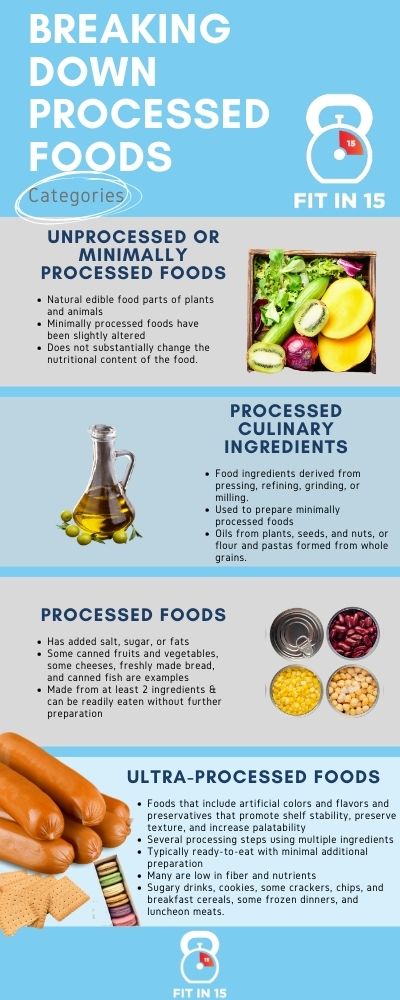Reduce These Foods NOW to Reduce Early Death Risk
Overview
According to the International Food Information Council, processed food is defined as any deliberate change to a food that occurs before it gets consumed by us.
Methods such as heating, pasteurizing, drying, and canning are all forms of processing. Additionally, some experts include refrigeration in this definition (no worries, more on that later)
Unless you are eating fruits, vegetables, and meats directly from the source without any modifications, you will technically be consuming some level of processed foods.
Logically speaking, freezing a vegetable for later does not turn it into junk food; therefore, we need to tweak our definition a bit.
To distinguish between junk foods and preserved whole foods, some experts started referring to junk foods as ultra-processed foods.
The first time that the term of ultra-processed food was used dates back to 2016 when Brazilian nutrition researchers linked these foods to cancer.
As a result of this research, we now have a classification system called NOVA, which categorizes foods based on the degree of processing.

The 2 Sides of NOVA spectrum:
Unprocessed/minimally-processed foods – these include fresh fruits, vegetables, and eggs.
Ultra-processed foods – defined as industrial formulations with five or more ingredients.
Unfortunately, we still don’t have a consensus on the definition of processed foods since every study seems to choose different criteria to refer to ultra-processed foods.
Regardless of this terminology mess, ultra-processed foods are culprits of causing several disease processes.
In this article, we will uncover a way to determine what is considered ultra-processed and how consuming these foods increases your risk of death exponentially.
First, what are Ultra-Processed Foods
The risks that come with ultra-processed foods
In a recent study published in the journal Cell Metabolism, researchers compared the effects of an ultra-processed diet to a normal diet without any processed foods. The study included 20 overweight individuals staying in a hospital.
To test the effects of food on participants, each one had to follow two phases composed of 14 days each. During the first phase, participants had to consume ultra-processed foods, whereas the second phase included no processed foods.
To eliminate variables, the meals presented during each phase were matched for the total calories, fat, carbohydrate, protein, sugars, and fiber content. The only difference between the meals was the source of calories (the first phase – processed foods, the second phase – unprocessed foods).
Finally, scientists told the participants that they can eat as much or as little as they want.
At the end of the study, researchers found that during the ultra-processed food phase, participants consumed 500 more calories relative to the unprocessed diet. Additionally, fat and carbohydrates were the primary macronutrients in the ultra-processed diet.
In the first phase of the trial (ultra-processed foods), participants gained an average of two pounds of body weight, which they lost during the second phase of the study.
The authors of the study concluded that limiting ultra-processed foods may be an effective approach to prevent obesity and its associated complications.
Ultra-processed foods and heart disease
In another study, researchers examined the records of more than 100,000 French individuals over the course of 5 years. The study concluded that those who excessively consumed ultra-processed foods had a higher risk of coronary artery disease, strokes, and cardiovascular dysfunction.
Despite removing external factors that may interfere with the results of this study, the risk remained significant.
The factors accounted for include the amounts of saturated fat, sodium, sugar, and dietary fiber in the diet.
We should note that this is an observational study, which doesn’t provide a cause-effect relationship; however, the statistical difference is still too significant.
More research…
According to the Department of Epidemiology and Prevention at the I.R.C.C.S. Neuromed, the frequent consumption of ultra-processed foods increases the risk of heart disease and sudden death.
The researchers of this department found a solid link between consuming ultra-processed foods and an increased risk of death.
The study used data of more than 22,000 participants who were part of the Moli-sani project and concluded that consuming high amounts of ultra-processed foods increases the risk of death from heart disease by up to 58%. The risk of dying from all causes also increased by 26%.
The data took into account the eating habits and health issues over a period of 10 years. By far, sugar intake seemed to be the greatest risk factor of dying from heart disease.
Researchers expressed their concern about the results of the study due to the widespread availability of ultra-processed foods and how common their consumption is by the general population.
These foods participate in the formation of atheromatous plaques inside the coronary arteries, which block the circulation to the heart muscle. As a result, myocardial infarction (i.e., heart attack) sets in.
Since ultra-processed foods have high concentrations of free radicals that induce a state of oxidative stress, the risk of obesity, cancer, and other devastating conditions also increases.
Oxidative stress and heart disease
If you are not familiar with oxidative stress, here is a quick definition:
In the cell, there are two groups of substances that balance each other. The free radicals, which have the ability to destroy the cell membrane of pathogens. The second group consists of antioxidants, which neutralize the action of free radicals to prevent the death of the cell.
Unfortunately, the balance between these two systems can go array, leading to severe health complications, including heart disease, diabetes, and cancer.
Ultra-processed foods shift the balance towards oxidative stress by pumping the body with large amounts of free radicals.
Overall, consuming ultra-processed foods seems to increase the risk of heart disease, as well as other life-threatening conditions, which is why we need to pay more attention to the foods we consume.
Takeaway message
Ultra-processed foods increase the risk of heart disease, obesity, and cancer. It is crucial for governments and healthcare institutions to scrutinize the production and distribution of these substances to prevent severe morbidity and mortality.
We hope that this article highlighted the danger posed by consuming ultra-processed foods.
If you have any questions, concerns, or a personal story about ultra-processed foods, please don’t hesitate to share your thoughts email [email protected]


